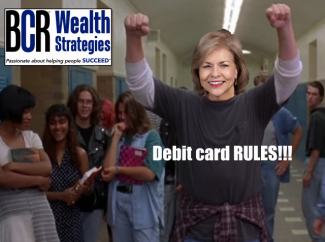
Debit Card Rules
I received a remarkable reply to my recent blog, What’s the Different Between a Credit Card and a Debit Card? A dedicated reader sent me the following information about his real life experience with debit cards. I think this is so valuable I’m sharing with you.
Here is the email from our reader:
The latest BCR Wealth Newsletter contained a piece by Sandra Cleveland titled What's the difference between a credit card and a debit card?
I read this with interest given all the problems my youngest had with using their credit union debit card while a college student. College students may be a special case due to their limited funds, but the article didn't warn of any peculiar pitfalls of debit card. She states:
When you make a purchase with a debit card, it draws the money from your checking account by placing a hold on the amount of the purchase. The merchant sends your transaction to their bank and the bank pulls the amount of the purchase from your account to their account and the hold drops off your account. The transaction shows up on your bank account.
True, but what happens when the hold expires before the transaction is processed? The user, especially an inexperienced one, will check their balance and think they have more money in the account than they actually do. If you don't keep a running account like a check book register, anyone could get confused when every daily purchase is done with the debit card.
Worse, the rules placed on the banking industry are different with a debit card than they are with a checking account, forget about a credit card. Real world example:
If a checking account user writes three checks that total up to be more than the balance in their account, even though the first two checks are within the balance, obviously an overdraft fee is applied the last of the three checks to clear....one overdraft fee. For some reason still unclear to me, in the case of a debit card, the credit union is allowed to apply an overdraft fee to each of the three transactions, even though there were enough funds to cover the first two transactions. In some cases, I should state that the balance only went negative because of multiple unnecessary overdraft fees. I know this because I challenged the credit union on my son's behalf on several occasions, with his statement in hand as proof that only the very last of multiple transactions in a short period of time was actually an overdraft, and only then because the hold had dropped before a merchant from over a week ago finally processed the old purchase. At that point in time, overdraft fees were $20 each, and he was being charged $60 to $100 on a given day.
Lessons Learned from a credit union phone teller:
- She would never suggest a debit card for anyone who makes frequent small purchases with a relatively low balance. Checking your balance online frequently doesn't tell the whole story. This phone teller said she sure didn't let her son use one at college.
- If you really want to be sure not to overdraft, keep a checkbook style register....not the debit card convenience that the banks like to advertise.
- Get rid of overdraft protection on your debit card. Yes, you risk embarrassment at the checkout register if your card is rejected, but that's better than piling up multiple overdraft fees.
As I'm sure you're still wondering, yes, the credit union told me in writing that the banking laws that govern them allow them to charge multiple overdraft fees on each of a group of transactions that total up to be an overdraft, although one or more of the group do not constitute an overdraft. My rational brain still rejects that as neither logical or fair.
End of email.
This is not the kind of information you find when you research how a debit card works. You only learn this from someone who has experienced it.
Also, not all financial institutions behave the same. I encourage you to reach out to your bank or credit union if you have any questions about your specific account and/or debit card.
Please take this information into account as you consider the benefit a debit card may provide for you or your family members. I feel sure most people you would share this with, do not know this either.
-Sandra Cleveland

